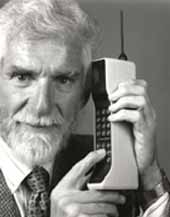How to select a cell phone these days

Motorola Cell Phone 1983
Back in the old days it was easy to buy a cell phone – if it made phone calls you were good to go. At some point the cell phone became the “smart phone” which is really code for “universal communications and entertainment device that fits in a pocket.” It’s pretty amazing really, but a short list of things I expect my phone to do these days includes:
- Web browser
- E-mail device
- Contact and calendar management
- Task managment and notepad
- Instant/text messaging
- GPS moving map with audible turn-by-turn directions
- Watch television shows, movies and YouTube
- Music player (and music store)
- Mobile hot spot providing Internet access for multiple computers
- Manage my Netflix movie queue
- Still camera and audio/video recorder
- Weather reports with animated radar images
- Animated airline flight tracker
- Make phone calls
If 1990 started the decade of the personal computer and 2000 was the beginning of the Internet decade, there’s no doubt that 2010 is the beginning of the cell phone/pocket computer age. Apple’s iPhone is the clear leader right now, but new Android phones (running Google’s phone operating system) and the Palm Pre and Pixi (running Palm’s WebOS) are finally ready to give Apple some long overdue competition.
Technology people have unique needs, like hosting a Web site in their pocket, or accessing a corporate VPN. But the phone advice I give “normal” people goes something like this. It’s all about the network. If you can’t make calls from home, or get a fast data connection at the office it doesn’t matter how many cool apps you have. I personally know iPhone owners all over the country who live with dropped calls, slow data transfers, etc. (AT&T problems, not really iPhone problems. See a recent PC World article comparing the US 3G networks. Their summary: “Reliability was an issue in our experience of the AT&T system: Our testers were able to make a connection at a reasonable, uninterrupted speed in only 68 percent of their tests.”) For me Sprint has been a clear winner on the network front – I’m responsible for six phones and we travel frequently so we have lots of first hand experience with the Sprint network and customer service. But the final answer depends very much on geography and travel patterns.
After making the network/carrier decision the next is the form factor, particularly the question of on-screen or real keyboard. If you can’t type it’s going to be really frustrating. If the device is too big for your pocket you won’t be happy carrying it around all day. If the screen is too small for your aging eyes you won’t be comfortable reading much. If you never tried an on-screen keyboard don’t be afraid to try it out. They are very good these days and most people find them easier than using the tiny keys on “real” keyboards.
For many people the price will be the third factor in making a decision. A lot of “perfect” phones (and computers, cars, houses, women) are just out of the price range. Watch for sales and expect all prices to drop as the competition heats up.
App selection ends up as the last criteria, and usually not even an option because you’ll get whatever comes with the device that otherwise meets your needs. The bottom line is that you can always carry a second device (notebook, netbook, smartbook, tablet) with a bigger screen or applications that you need, but a bad phone decision is hard to work around.
Personally I’m sticking with my Palm Pre for now, but will probably switch to an Android phone soon.